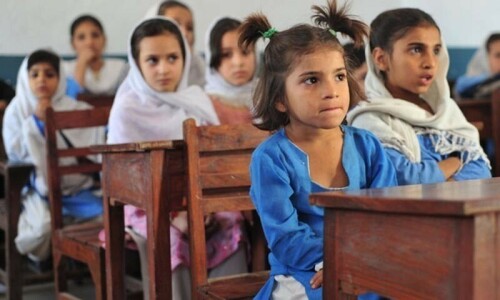MUZAFFARABAD: Less than two weeks ahead of the 75th anniversary of a United Nations Security Council (UNSC) resolution on Jammu and Kashmir, an organisation of Kashmiri activists launched the ‘Right to Self-Determination Campaign’ from the Neelum Valley as part of its consistent efforts to remind the international community, and the world body in particular, of their unfulfilled promises to the Kashmiri people.
Organised by Pasban-e-Hurriyat Jammu Kashmir (PHJK), an outfit representing post-1989 migrants from Indian-occupied Jammu and Kashmir, the campaign began with a rally in Athmuqam, the district headquarters of Neelum valley, followed by a march along the main road to Chilyana village.
The Neelum River serves as the Line of Control (LoC) in most areas between Athmuqam and Chilyana, with Indian military posts across the river, visible even with the naked eye from the liberated territory.
The marchers, including women, carried banners inscribed with slogans condemning the war crimes committed by Indian forces in occupied Jammu and Kashmir and demanding the United Nations and the global community to fulfill their long-overdue commitments regarding a plebiscite in the disputed region.
“The UNSC must implement its resolution of January 5, 1949, regarding the state of Jammu and Kashmir,” read one large banner.
Participants waved the flags of Azad Jammu and Kashmir (AJK) and Pakistan and chanted slogans denouncing Indian atrocities and demanding freedom for Kashmiris.
The January 5, 1949, UNSC resolution had called for a plebiscite to allow the people of Jammu and Kashmir to determine their future between India and Pakistan. However, the resolution remains unimplemented, leaving Jammu and Kashmir as a flashpoint in South Asia.
Earlier, at the rally in Athmuqam, PHJK leaders including its chairman Uzair Ahmad Ghazali and local traders’ association’s office-bearers, councillor Raja Iftikhar Ahmad Khan, and others addressed the participants.
They vehemently criticised India for its continued military aggression and suppression of Kashmiri voices through arbitrary arrests, extrajudicial killings, and widespread human rights violations in occupied Jammu and Kashmir.
The failure to implement UNSC resolutions had created a climate of fear, instability, and mistrust in the region, jeopardizing peace in South Asia, said Mr Ghazali.
Highlighting the implications of India’s actions, including the unilateral revocation of Jammu and Kashmir’s special status on August 5, 2019, he warned that such imperialist policies could escalate tensions in the already volatile region.
During the march, Pasban-e-Hurriyat Jammu Kashmir women’s wing head Mehnaz Qureshi, who was born in the Indian occupied territory, also shared her ordeal.
”I left my home just across this bloody divide as a minor, hoping to return soon. Decades later, I still wait for the day when my children can see the land of their ancestors free from oppression,” she said.
Published in Dawn, December 26th, 2024















































Dear visitor, the comments section is undergoing an overhaul and will return soon.